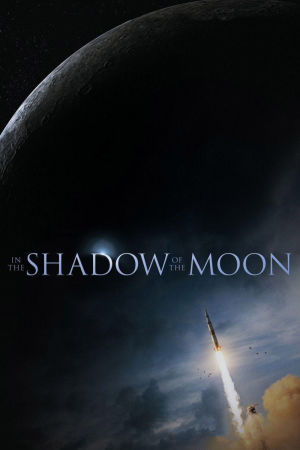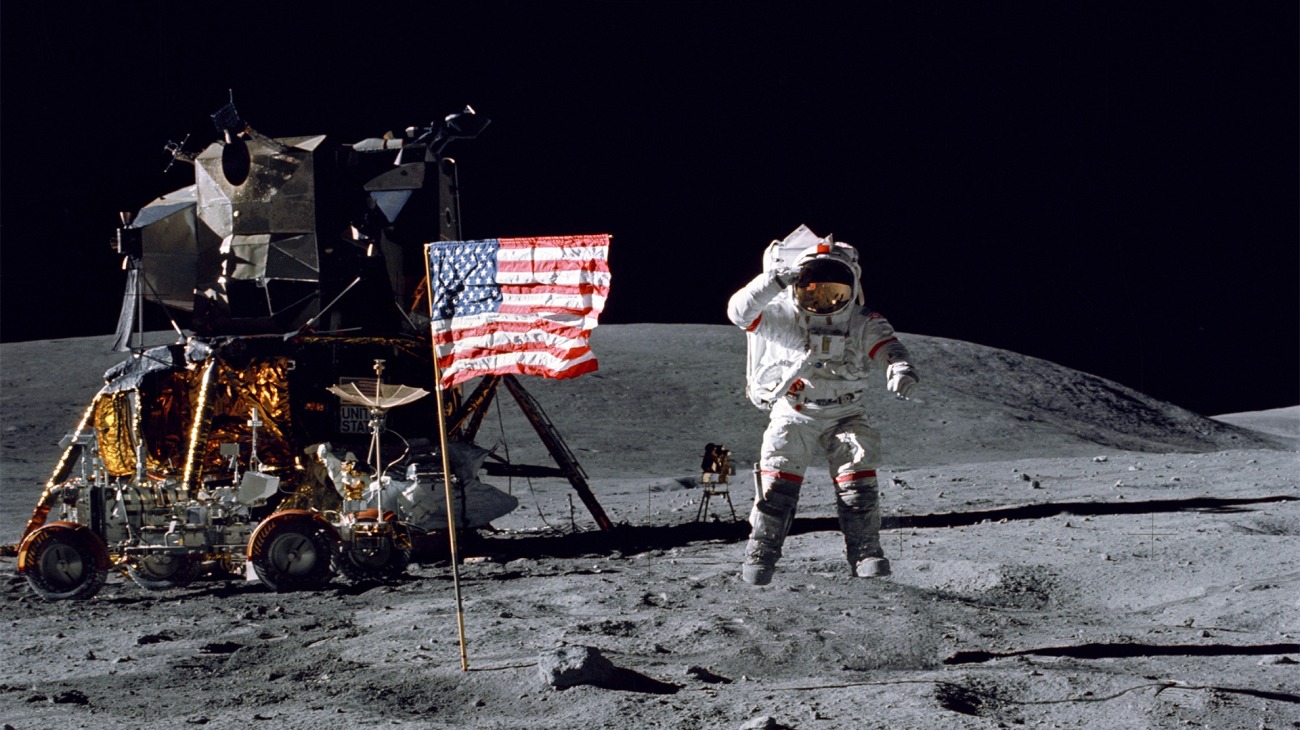
Trips to the moon
I was not alive during the 1960s, but that decade has been so thoroughly strip-mined and repackaged that I sometimes wonder if I've missed out on anything.
But then, I see something like In the Shadow of the Moon, and I am reminded: I missed that. You know, that whole "Space Age" thing.
To be perfectly fair, that same cultural strip-mining has left David Sington's new documentary about the Apollo astronauts somewhat irrelevant: between the Discovery Channel (which co-produced this) and Apollo 13 (directed by Ron Howard, who "presents" this) and so on and so forth, anyone who is interested in this stuff has seen quite a lot of it, such that even a child of the '80s like myself can count himself an armchair expert on the ways and means of NASA. So yet one more documentary about the Apollo program is more than a bit redundant.
And yet. There is enough rare footage in this new project to justify its existence, and that's saying nothing of the film's primary coup: scoring interviews with every still-living veteran of the Apollo flights with the significant exception of Neil Armstrong, a notoriously camera shy individual. It's these interviews, underpinning nearly all of the film's 100 minutes, that cause it to rise from a mere compendium of Saturn V launch footage to an active and engaging look at the human side of the program; also fairly well-trod ground, but never expressed with this candor and immediacy.
The astronauts are all blandly forthright in the way of old people (the participants range in age from 79-year-old Jim Lovell to 72-year-old Harrison Schmitt), downplaying the notion that they are heroes, brushing off the poetic imagery that has accreted to their names. Michael Collins, the man who stayed in orbit when Armstrong and Buzz Aldrin walked on the moon for the first time, tosses out-of-hand the idea that he was gripped by existential loneliness during his time alone on the dark side; Alan Bean of Apollo 12, given perhaps the largest share of screentime, turns pretty much everything into a witticism. These are sharp old men and completely unromantic, and one is glad that they were all gathered in one place like this so near to the end of their lives, and that all of them seem to have spent the last 35 or 40 years living and not being locked in like statuary at the peak of their fame. The general feeling seems to be, "sure that was a pretty amazing thing we did, but that was so long ago, and it was just kind of our job."
That makes these men human in a way that we don't get to see very often; every other filmed retelling of Apollo that I am familiar with (particularly the "fictional" versions, Apollo 13 and Howard & Tom Hanks's From the Earth to the Moon) trades heavily in the notion that these were men taken up by the winds of history, actors in a great tapestry. As we see them here, wryly thinking back on their younger selves, it's fairly clear that they viewed themselves as guys just doing what they did. Not false modesty - they don't seem to register having much of anything to feel modest about.
Perhaps because of this anti-romanticism, In the Shadow of the Moon is much more compelling as a nuts 'n' bolts version of the Apollo mission than the typical "historic" approach, and for this particular space junkie, that is a welcome point of view, indeed. Watching the footage, both distressingly familiar and completely new, with the relaxed voices of the old astronauts giving context, the images begin to lose their poetic glow and instead return to their actual function: documents of a scientific and mechanical process. Frankly, that makes them more interesting and even a bit more exciting. This is not a film about a great modern American myth, but a great American project, and that perspective is too often ignored.
There are a few conspicuous missteps. When the astronauts talk about their international reception and comparisons are made to our country's current isolationist streak, it's obvious that somebody wanted to make a political point, but it's nothing the film can't handle. When, near the end, the talk turns to global warming (and, oddly, to the conspiracy theories that all the landings were staged), it becomes a bit too shrill; yes, global warming matters and it's very "hip," but this is a movie about space travel in 1968-1972. Time and place. That's of course all above and beyond the simple damning fact that, new point-of-view or not, this is not a story that was dying to be retold.
But those are quibbles. This is still a completely energising look at one of the greatest achievements in US history, and it does something that we all need from time to time: it reminds us of how fantastic that achievement was. I was not alive during the 1960s; but sitting in the dark, watching the moon landing on a big screen, I had a fairly decent sense of what it might have felt like.
But then, I see something like In the Shadow of the Moon, and I am reminded: I missed that. You know, that whole "Space Age" thing.
To be perfectly fair, that same cultural strip-mining has left David Sington's new documentary about the Apollo astronauts somewhat irrelevant: between the Discovery Channel (which co-produced this) and Apollo 13 (directed by Ron Howard, who "presents" this) and so on and so forth, anyone who is interested in this stuff has seen quite a lot of it, such that even a child of the '80s like myself can count himself an armchair expert on the ways and means of NASA. So yet one more documentary about the Apollo program is more than a bit redundant.
And yet. There is enough rare footage in this new project to justify its existence, and that's saying nothing of the film's primary coup: scoring interviews with every still-living veteran of the Apollo flights with the significant exception of Neil Armstrong, a notoriously camera shy individual. It's these interviews, underpinning nearly all of the film's 100 minutes, that cause it to rise from a mere compendium of Saturn V launch footage to an active and engaging look at the human side of the program; also fairly well-trod ground, but never expressed with this candor and immediacy.
The astronauts are all blandly forthright in the way of old people (the participants range in age from 79-year-old Jim Lovell to 72-year-old Harrison Schmitt), downplaying the notion that they are heroes, brushing off the poetic imagery that has accreted to their names. Michael Collins, the man who stayed in orbit when Armstrong and Buzz Aldrin walked on the moon for the first time, tosses out-of-hand the idea that he was gripped by existential loneliness during his time alone on the dark side; Alan Bean of Apollo 12, given perhaps the largest share of screentime, turns pretty much everything into a witticism. These are sharp old men and completely unromantic, and one is glad that they were all gathered in one place like this so near to the end of their lives, and that all of them seem to have spent the last 35 or 40 years living and not being locked in like statuary at the peak of their fame. The general feeling seems to be, "sure that was a pretty amazing thing we did, but that was so long ago, and it was just kind of our job."
That makes these men human in a way that we don't get to see very often; every other filmed retelling of Apollo that I am familiar with (particularly the "fictional" versions, Apollo 13 and Howard & Tom Hanks's From the Earth to the Moon) trades heavily in the notion that these were men taken up by the winds of history, actors in a great tapestry. As we see them here, wryly thinking back on their younger selves, it's fairly clear that they viewed themselves as guys just doing what they did. Not false modesty - they don't seem to register having much of anything to feel modest about.
Perhaps because of this anti-romanticism, In the Shadow of the Moon is much more compelling as a nuts 'n' bolts version of the Apollo mission than the typical "historic" approach, and for this particular space junkie, that is a welcome point of view, indeed. Watching the footage, both distressingly familiar and completely new, with the relaxed voices of the old astronauts giving context, the images begin to lose their poetic glow and instead return to their actual function: documents of a scientific and mechanical process. Frankly, that makes them more interesting and even a bit more exciting. This is not a film about a great modern American myth, but a great American project, and that perspective is too often ignored.
There are a few conspicuous missteps. When the astronauts talk about their international reception and comparisons are made to our country's current isolationist streak, it's obvious that somebody wanted to make a political point, but it's nothing the film can't handle. When, near the end, the talk turns to global warming (and, oddly, to the conspiracy theories that all the landings were staged), it becomes a bit too shrill; yes, global warming matters and it's very "hip," but this is a movie about space travel in 1968-1972. Time and place. That's of course all above and beyond the simple damning fact that, new point-of-view or not, this is not a story that was dying to be retold.
But those are quibbles. This is still a completely energising look at one of the greatest achievements in US history, and it does something that we all need from time to time: it reminds us of how fantastic that achievement was. I was not alive during the 1960s; but sitting in the dark, watching the moon landing on a big screen, I had a fairly decent sense of what it might have felt like.
Categories: documentaries, space






